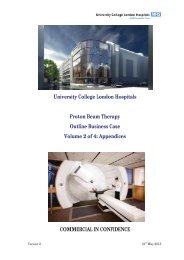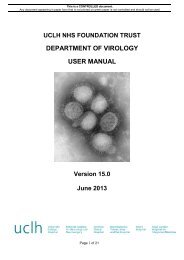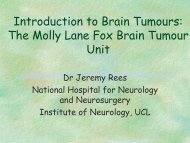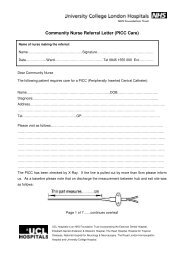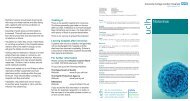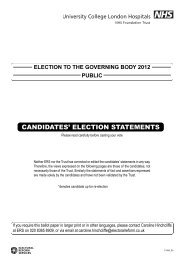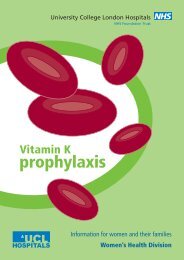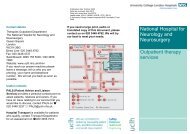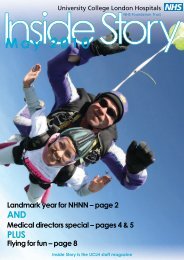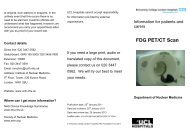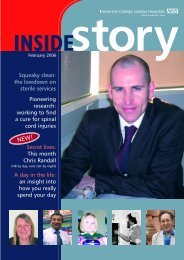August 2012 - University College London Hospitals
August 2012 - University College London Hospitals
August 2012 - University College London Hospitals
You also want an ePaper? Increase the reach of your titles
YUMPU automatically turns print PDFs into web optimized ePapers that Google loves.
Inside Story<br />
<strong>August</strong> <strong>2012</strong><br />
Follow us: @uclh<br />
Celebrity visits – page 3<br />
AND<br />
Olympic torch relay – pages 4 & 5<br />
PLUS<br />
New staff awards – page 7<br />
Inside Story is the UCLH staff magazine
news<br />
2<br />
Driving down C.diff rates<br />
The number of haematology patients<br />
developing clostridium difficile (C.diff)<br />
whilst in UCLH has fallen following<br />
an intensive drive to reduce rates of<br />
infection.<br />
Cancer treatments put patients at<br />
increased risk of developing the<br />
debilitating bug in their gut, causing<br />
severe diarrhoea and stomach<br />
cramps. The infection can be<br />
transferred to others via hand contact,<br />
environmental contact or even airborne<br />
spores.<br />
Prompted by a review of the number<br />
of C.diff cases in the cancer speciality,<br />
nurses, doctors, microbiologists<br />
and pharmacists worked together to<br />
scrutinise every aspect of care and<br />
to identify particular risks: antibiotic<br />
usage, cleaning techniques and hand<br />
hygiene.<br />
Dr Vanya Gant, consultant<br />
microbiologistand clinical director,<br />
infection, said: “The fall is likely to<br />
represent the combined efforts of<br />
many including the infection control,<br />
haematology and cancer, consultant<br />
Liberating sisters to lead<br />
Ward sisters will spend less time<br />
on corporate and admin work and<br />
more time on leading their teams<br />
and improving the care their patients<br />
receive. The Trust aims to increase<br />
clinical leadership time to 75% in the<br />
next few years.<br />
The new initiative – believed to be the<br />
first of its kind in the NHS – supports<br />
The “liberating sisters to lead” project team<br />
Clostridium<br />
difficile<br />
(C.diff )<br />
Wash<br />
your<br />
hands<br />
of it<br />
the Trust’s vision to put ward sisters at<br />
the heart of patient care.<br />
UCLH won £420,000 from The Health<br />
Foundation to establish a ‘concierge’<br />
style service to support ward sisters<br />
with requests or information they need<br />
on HR, ICT, finance, procurement<br />
and estates and facilities issues. The<br />
support team will simplify and improve<br />
Contact us<br />
If you have any information you would like included in Inside Story, or on Insight,<br />
contact: Communications Unit, 2nd Floor Central, 250 Euston Road, <strong>London</strong> NW1<br />
2PG. Email: communications@uclh.nhs.uk, Tel: ext 79897, Fax: ext 79401.<br />
and nursing teams. This is based<br />
on an overarching approach relating<br />
to delivery of care in an evercleaner<br />
environment, as well as very<br />
close daily scrutiny of all antibiotic<br />
prescribing on that unit.<br />
Stephen Rowley, lead cancer nurse,<br />
said they worked with the infection<br />
control team to re-look at practices.<br />
He added: “We found some gains in<br />
areas where we didn’t think there was<br />
potential for improvements.”<br />
The type of cleaning agent used on<br />
the haematology wards was changed<br />
and all staff were reminded of the risks<br />
of bacterial transference including<br />
common touch points such as door<br />
handles.<br />
The level of scrutiny during the<br />
monthly hand hygiene audits was also<br />
increased.<br />
Even more stringent government<br />
thresholds come into force this year<br />
and Trusts face penalties if they<br />
exceed them. The C.diff threshold for<br />
UCLH is 44 cases or under compared<br />
to 59 in 2011/<strong>2012</strong>.<br />
ward sisters’<br />
interactions with<br />
these corporate<br />
functions. It will also<br />
establish more streamlined ways of<br />
working by reviewing processes.<br />
Michelle McIntosh, a ward sister at<br />
the NHNN David Ferrier Ward and a<br />
member of the project group, said:<br />
“It will create more time for us to be<br />
visible on the wards: carrying out<br />
daily rounds, listening to patients at<br />
the bedside and being part of the<br />
multi-disciplinary team ward rounds to<br />
ensure continuity and quality of care.”<br />
They will also have more time to lead<br />
teams on initiatives such as 11am<br />
discharges, coding sheets, intentional<br />
rounding, falls and pressure ulcer<br />
prevention.<br />
UCLH will share its learning with other<br />
hospital Trusts.<br />
Front cover: An Olmypic torch<br />
comes to the Heart Hospital
news<br />
Comedy, magic and music: the perfect combination<br />
A trio of celebrity guests visited UCLH this month to<br />
support the work of the Trust and spread some cheer on<br />
the wards.<br />
Multi-million selling singer Dido (pictured top) said she<br />
was ‘eternally grateful’ to UCLH for the treatment her late<br />
father received as he battled a debilitating illness.<br />
The recording artist said she had been given ‘extra years’<br />
with her dad William because of the expert treatment he<br />
received for lupus at <strong>University</strong> <strong>College</strong> Hospital.<br />
She was speaking after unveiling a plaque announcing the<br />
UCLH Centre for Rheumatology as a LUPUS UK Centre<br />
of Excellence.<br />
Lupus is an unpredictable and potentially fatal autoimmune<br />
disease in which the immune system is out of balance,<br />
causing inflammation and tissue damage to any organ<br />
system in the body. There is no cure.<br />
The health effects of lupus include heart attacks, strokes,<br />
seizures, and organ failure. At least five million people<br />
worldwide have a form of lupus.<br />
Dido’s father was diagnosed in 2001 and was treated by<br />
UCLH consultant rheumatologist Professor David Isenberg,<br />
a world-leading expert on the condition, at the <strong>University</strong><br />
<strong>College</strong> Hospital Lupus Clinic.<br />
Dido said: “My dad was looked after by Professor Isenberg<br />
and my family and I have always been eternally grateful to<br />
him because we got so much extra time with dad. We have<br />
always felt a connection with Professor Isenberg because<br />
we have so many brilliant memories because of him.”<br />
UCLH works very closely with UCL to research new<br />
treatments and different combinations of treatments to<br />
improve the outcomes and care for patients with lupus.<br />
Meanwhile, comedian and TV presenter Harry Hill (pictured<br />
bottom with 17-year-old Shauna Glynn) helped launch this<br />
year’s National Play in Hospital Week by judging an art<br />
competition for young patients on T12.<br />
Irene O’Donnell, play services manager, said: “We were<br />
delighted that Harry agreed to judge the competition for us as<br />
the children really enjoyed taking part and sharing their views<br />
of play in hospital.”<br />
National Play in Hospital Week is organised by Starlight<br />
Children’s Foundation, and aims to promote and ensure the<br />
provision of appropriate therapeutic and stimulating play<br />
facilities in hospital.<br />
Gasps of disbelief greeted magician Dynamo (pictured<br />
centre with Leo Schubaeh) when he displayed some of his<br />
mesmerizing tricks during his visit to the UCH Teenage Cancer<br />
Trust unit.<br />
The ‘Magician Impossible’ treated staff and patients to some<br />
mesmerising tricks which have stunned A-list celebrities<br />
around the world.<br />
Dynamo made headlines following a 10,000-1 prediction on<br />
how Spain would win Euro <strong>2012</strong>. He guessed correctly every<br />
winner from the quarter-finals onwards, he even predicted two<br />
penalty shootouts, including England’s quarter-final defeat to<br />
Italy. He donated his £10,000 winnings to Teenage Cancer<br />
Trust.<br />
3
4<br />
Olympic torch<br />
Olympic torch comes to UCLH<br />
UCLH has hosted its own Olympic torch relay during a<br />
whistle-stop tour around all our hospital sites.<br />
Accompanied by security, a photographer and Elke<br />
Tullett from the communications unit, the gleaming<br />
torch attracted crowds of staff, patients and public – all<br />
wanting to be photographed with the iconic emblem.<br />
First stop was the Eastman Dental Hospital courtyard,<br />
where a glimpse of the torch proved a magnet for<br />
droves of Olympic lovers. “It looks lovely. What a great<br />
start to the week,” said head dental nurse Pamela<br />
Parker as she held the torch aloft.<br />
“Who’s that man? Is he in the Olympics?” said passerby<br />
Javid Taebiaso, the first of many to question the<br />
identity of the torch bearing guardian.<br />
That man was Rod Townley, Trust’s head of security<br />
charged with protecting it. Ok – he may not be an<br />
Olympian but he did cycle 500 miles from Paris to<br />
Geneva up and over the Pyrenees in a gruelling four<br />
day competition – so as good a chap as any to guard<br />
the prized torch.<br />
The aluminium torch is perforated by 8,000 circles<br />
– representing the inspirational stories of the 8,000<br />
torchbearers who have been transporting the flame the<br />
length and breadth of Britain.<br />
Then a quick sprint to the Royal National Throat Nose<br />
and Ear Hospital along Gray’s Inn Road where staff<br />
were waiting for its arrival. Time for a few quick snaps –<br />
then off to the NHNN.<br />
Among the staff was senior staff nurse Ana Marta-Vidal.<br />
Matron Liz Davies said Ana lived the Trust values. “She<br />
is kind, caring, always see the bigger picture but always<br />
puts the patient first.”<br />
A saunter to the Royal <strong>London</strong> Hospital for Integrated<br />
Medicine – and staff and patients had already<br />
assembled, mobile phone cameras ready and waiting.<br />
Then The Heart Hospital – a very civilised, quiet affair<br />
in leafy West Moreland Street – followed swiftly by the<br />
<strong>University</strong> <strong>College</strong> Hospital Macmillan Cancer Centre.<br />
At the Hospital for Tropical Diseases, clinical scientist<br />
Colin Sutherland, who had tickets to watch the women’s<br />
water polo, rocked up on his cycle – just in the nick of<br />
time to join his colleagues.<br />
Outside the emergency department at <strong>University</strong><br />
<strong>College</strong> Hospital in Euston Road, chairman Richard<br />
Murley joined the emergency services team.<br />
Rachel Maybank, associate director of communications,<br />
said: “The communications unit spoke to the <strong>London</strong><br />
Organising Committee for the Olympic and Paralympic<br />
Games about having the torch for a day and were<br />
delighted when they said yes. We were really pleased to<br />
see such enthusiasm across the Trust.”<br />
First stop at the Eastman Dental Hospital<br />
Staff at the Royal National Throat, Nose and Ear Hospital<br />
At the Heart Hospital<br />
At the National Hospital fo<br />
At the Royal <strong>London</strong> Hosp
Olympic torch<br />
All smiles at the <strong>University</strong> <strong>College</strong> Hospital Macmillan Cancer<br />
Centre<br />
Then onto the Hospital for Tropical Diseases<br />
r Neurology and Neurosurgery<br />
Trust head of security, Rod Townley protects the torch<br />
ital for Integrated Medicine<br />
And last but not least at <strong>University</strong> <strong>College</strong> Hospital<br />
5
interview<br />
Making sense of the biggest buzzword<br />
Integration, integration, integration.<br />
It’s difficult to think of a bigger<br />
buzzword in the NHS at the moment.<br />
And much as Tony Blair made<br />
education his priority in Labour’s<br />
battle for office in 1996, the NHS has<br />
catapulted integration to the top of<br />
its ‘to do’ list as it looks to meet the<br />
challenges that lie ahead.<br />
UCLH is no different. The Trust has<br />
recently set up a Clinical Integration<br />
Group with senior management<br />
engagement and recruited a divisional<br />
clinical director for integration,<br />
Professor Mike Roberts.<br />
But speak to most people about<br />
integration and you may well be<br />
greeted with a blank stare. Few<br />
people, it seems, quite know exactly<br />
what it means.<br />
“Integration means lots of different<br />
things to different people,” says Prof<br />
Roberts, a respiratory physician and<br />
Dean at Barts and the <strong>London</strong> School<br />
of Medicine and Dentistry.<br />
“If we start with the patient, it means<br />
care that’s joined up between<br />
providers and better meets the<br />
patient’s needs.”<br />
Imagine a frail, elderly patient who<br />
finds it difficult to get out of the house<br />
but manages to live independently.<br />
She has diabetes, chronic kidney<br />
disease and hypertension and is<br />
admitted to hospital following a mild<br />
stroke.<br />
She is discharged home with a<br />
package, much of which requires<br />
multiple providers who don’t have a<br />
shared patient record. The patient is<br />
given outpatient appointments to see<br />
a diabetologist, cardiologist and stroke<br />
consultant – impossible challenges for<br />
somebody who is not mobile.<br />
Things start to go wrong. Work is<br />
duplicated with multiple agencies<br />
sending care workers to her home.<br />
Then her social care package<br />
does not appear and the patient is<br />
readmitted.<br />
The alternative is an example of<br />
how integration should work well in<br />
healthcare.<br />
The patient is managed through a<br />
team which includes a geriatrician<br />
working with a stroke physician,<br />
a team of community nurses and<br />
6<br />
a social worker. They discuss the<br />
patient’s needs and implement an<br />
agreed package of care in liaison with<br />
her GP. They have a shared electronic<br />
record so everybody is aware what the<br />
care plan is and discuss the patient at<br />
a weekly community multi-disciplinary<br />
team meeting until she is stable. Care<br />
is delivered to the patient in her own<br />
home and specialty care delivered by<br />
the GP who has the care plan and the<br />
direct phone number and email for the<br />
relevant specialists at UCLH. This is<br />
truly joined up care.<br />
Doing integration well is a genuine<br />
‘win win’. Patient care improves – they<br />
are more likely to stay at home and<br />
less likely to re-present to A&E – as<br />
does the Trust’s relationship with GPs<br />
and commissioners.<br />
Prof Roberts said: “Commissioners in<br />
Camden and Islington have taken a<br />
very positive and cooperative view of<br />
the future and really want to engage<br />
with us and other providers.”<br />
The focus on integration is already<br />
paying off in some areas where<br />
the Trust is working closely with<br />
community and GP services. For<br />
example its new integrated services<br />
in heart failure, chronic obstructive<br />
pulmonary disease (COPD), frail<br />
elderly and diabetes with chronic<br />
kidney disease.<br />
Significant effort is being made to<br />
ensure communication with GPs<br />
is improved – one of their biggest<br />
bugbears with the Trust. Providing<br />
strong access to clinicians and<br />
services via telephone or email,<br />
timely and accurate discharge<br />
information and outpatient letters, sent<br />
electronically wherever possible and<br />
making IT systems with test results<br />
more accessible are just some of the<br />
areas of focus. A new web ‘app’ has<br />
been developed for mobile phones<br />
to give GPs access to service and<br />
consultant details at the tips of their<br />
fingers.<br />
Prof Roberts says: “It’s important to<br />
concentrate on our relationship with<br />
GPs because it’s the best way of<br />
improving patient care.”<br />
He wants the Trust to be setting the<br />
agenda for integration in the coming<br />
year, rather than playing a passive<br />
role.<br />
“At present it’s pretty much a blank<br />
page but we have a great opportunity<br />
to get clinicians and managers actively<br />
engaged in this process and free<br />
them up to think about how we can<br />
better deliver care and break away<br />
from the historic ways that have been<br />
perpetuated since the NHS was<br />
established.”
UCLH will next month launch<br />
its new Celebrating Excellence<br />
Awards which will culminate in<br />
a glittering award ceremony to<br />
honour the winners.<br />
The awards, funded by UCLH<br />
Charity, will formally recognise<br />
the achievements of Trust staff.<br />
The awards can be split into three<br />
categories; ‘Contribution to our<br />
Vision’, ‘Living the Values’ and<br />
‘Going Above and Beyond’. The<br />
Celebrating Excellence Awards<br />
will build on the Trust’s Service<br />
Commitment Awards.<br />
Sir Robert Naylor, UCLH chief<br />
executive, said: “UCLH’s success<br />
depends on amazing people<br />
delivering exceptional results<br />
and our awards are intended to<br />
recognise at least some of these<br />
individuals and teams. It is right<br />
that we have an opportunity to<br />
celebrate their achievements in this<br />
way.”<br />
The award ceremony will celebrate<br />
the success and contribution of<br />
each shortlisted finalist and will<br />
be held on February 28 at One<br />
Moorgate Place, and will be<br />
hosted by a special celebrity guest.<br />
Shortlisted finalists will be treated<br />
to a private drinks reception in the<br />
members’ room with celebrity host,<br />
drinks with a wider audience and<br />
three course dinner.<br />
You can find details of how to<br />
nominate your colleagues as well<br />
as the prize for each award on<br />
the new Celebrating Excellence<br />
Awards Insight pages.<br />
Nominations for all awards will<br />
open in early September and close<br />
in late-October.<br />
Top award – and blessings – for cancer centre!<br />
Buddhist monks were among<br />
those of different faiths who<br />
gave their blessing to the new<br />
<strong>University</strong> <strong>College</strong> Hospital<br />
MacMillan Cancer Centre<br />
during a special roof garden<br />
ceremony.<br />
Representatives from Biha’i,<br />
Jewish, Muslim, Christian<br />
and Sikh faiths were all<br />
represented, including staff<br />
and patients who did not have<br />
an affiliation to any particular<br />
faith. Candles were lit to<br />
symbolise hope for the new<br />
building.<br />
Meanwhile, the cancer<br />
centre has also won a top<br />
architecture award: the New<br />
<strong>London</strong> Awards honour the<br />
capital’s very best in design,<br />
planning and development.<br />
Hopkins Architects and<br />
Skanska Construction won the<br />
health category.<br />
our trust<br />
Coming soon: new-look awards to celebrate staff excellence<br />
The awards are:<br />
Contribution to our Vision’ Awards<br />
Contribution to world-class research<br />
award<br />
Chairman’s medal and Chairman’s<br />
award for contribution to excellence in<br />
education<br />
Gwyneth Griffiths award for contribution<br />
to top-quality patient care<br />
‘Living the Values’ Awards<br />
Safety award<br />
Kindness award<br />
Teamwork award<br />
Improving award<br />
‘Going Above and Beyond’ Awards<br />
Chief Executive’s award for outstanding<br />
leadership<br />
Chairman’s lifetime achievement award<br />
Chief Nurse’s prize<br />
Best UCLH trained newly qualified<br />
nurse<br />
UCH Nurses’ League-Christine<br />
Harcourt-Smith awards<br />
Going the extra mile – volunteer award<br />
7
the back page<br />
Our staff at the Olympics opening ceremony<br />
UCLH staff featured in<br />
the opening ceremony<br />
Gillian Basnett, lead nuse urooncology,<br />
Rohan Nauth-Misir,<br />
urology consultant and Sue Fell,<br />
urology continence nurse advisor<br />
UCLH volunteer Louise<br />
Pout in front of the<br />
‘cauldron’ at the Olympic<br />
Stadium<br />
Archives<br />
Bowling at Clacton:<br />
male patients bowling<br />
in the grounds of The<br />
Middlesex Hospital’s<br />
Convalescent Home at<br />
Clacton. Circa 1916.<br />
8



